Chicago 2019 mayoral candidates' key messages
2023 →
← 2017
|
| 2019 Chicago elections |
|---|
| Election dates |
| Filing deadline: November 26, 2018 |
| General election: February 26, 2019 Runoff election: April 2, 2019 |
| Election stats |
| Offices up: Mayor, City Council, City Clerk, & City Treasurer |
| Total seats up: 53 (click here for other city elections) |
| Election type: Nonpartisan |
| Chicago mayoral election |
| Runoff election overview |
| General election overview |
| Major issues |
| Candidates' key messages |
| Timeline of events |
| History of the office |
| Other Chicago elections |
| Chicago City Council |
| Chicago City Clerk & Treasurer |
| City elections in Chicago |
| Other municipal elections |
| U.S. municipal elections, 2019 |
Fourteen candidates ran in the race for mayor of Chicago, the nation's third-largest city by population, on February 26, 2019. Lori Lightfoot and Toni Preckwinkle advanced to a runoff election on April 2, 2019, which Lightfoot won. The seat became open when incumbent Rahm Emanuel announced in September 2018 that he would not seek re-election.
As part of our coverage of Chicago's 2019 mayoral election, Ballotpedia identified key messages of the 14 general election candidates. Key messages are a candidate's answer to the question, "Why should you vote for me?" We studied campaign websites, candidate forum opening and closing statements, campaign ads, and interviews to curate the messages that candidates repeated about themselves, their candidacies, and their takes on the 2019 mayoral race.
Refer to our 2019 Chicago mayoral election page for more coverage, including campaign finance data, polling, endorsements, debates and forums, and overviews of major issues in the race.
Click candidate names below to see their profiles on Ballotpedia, including career backgrounds and lists of policy priorities.
Key messages
Gery Chico
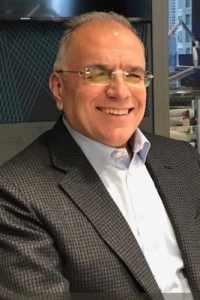 Chico said he had a record of "measurable results in all five places" of government he worked in, including Chicago Public Schools and the Chicago Park District.[1][2]
Chico said he had a record of "measurable results in all five places" of government he worked in, including Chicago Public Schools and the Chicago Park District.[1][2]
He highlighted that his grandparents immigrated from Mexico and said he acquired his work ethic from them. Chico said he was the candidate who would "give working families a break," criticizing challengers Susana Mendoza and Toni Preckwinkle regarding their histories on taxes and Bill Daley for his proposed commuter tax.[3]
Bill Daley
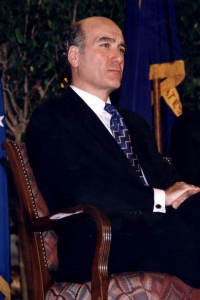
Asked why people should vote for him, Daley said, "My background, my experience, and my love for this city separates me from any others."[2]
He referred to himself as a lifelong Chicagoan and emphasized his experience working in the private sector as well as government, including as U.S. commerce secretary. He said he "knows that sustainable solutions require everyone to come to the table — business, labor, city, state — and unite around bold compromises."[4] He said his priorities as mayor would be freezing property taxes to keep families in their homes and implementing a plan to reduce crime.[5]
Amara Enyia
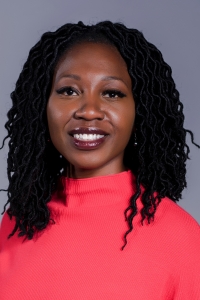 Enyia said her background in government, in the private sector, and as a community organizer gave her "the broadest lens with which to view the solutions that can help move us forward."[6]
Enyia said her background in government, in the private sector, and as a community organizer gave her "the broadest lens with which to view the solutions that can help move us forward."[6]
She said that "other candidates are part of the corruption and system that got us here in the first place" and that the 2019 election was a chance to elect a leader who would make real change.[7] Enyia emphasized justice and innovation as key themes of her candidacy, including her priorities of addressing disinvestment in certain communities and inequities in the education system.[6][8]
Bob Fioretti
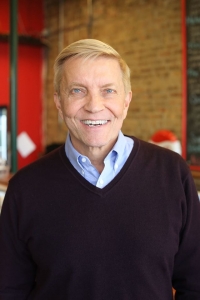
Fioretti said of the 2019 mayoral race, "If you're satisfied with the way this city is run, then I'm not your candidate."
He said he was an independent alderman with a record as a reformer and that he proposed reforms to the city council, such as banning outside employment for aldermen and instituting term limits, before other 2019 mayoral candidates did so. He listed an increase in jobs, safer streets, and improved schools as his accomplishments on the council.[1][9][10]
La Shawn Ford
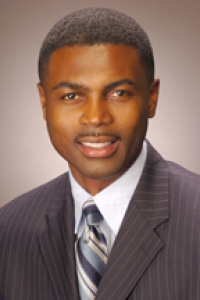
Ford referred to his experiences of losing family members to violence and having family members struggle with heroin and mental health issues. "Our city needs a mayor who has run a business, who has overcome challenges, who knows what real life is like, and who can help Chicago overcome challenges and become One Chicago, Powered by People," his campaign website said.[11] He stated his goal as helping the city heal by making it safer, healthier, and more affordable.
Ford said his record in the Illinois House included supporting marriage equality, sanctuary city status, making it easier for ex-offenders to find work, and expanding HIV screening.[1][2]
Jerry Joyce
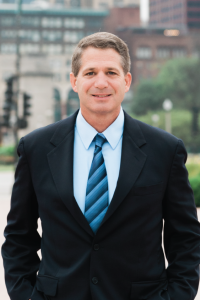
Joyce referred to himself as a lifelong Chicagoan, discussing his involvement in his neighborhood, including coaching youth wrestling and football.[12] Joyce said, "Chicagoans don't ask for a lot—safe streets; clean, effective, safe schools; and a fair and transparent system of taxation," and that he had the plans to bring them about.
He said that public safety was the main reason he entered the race, and he proposed "cracking down on repeat gun offenders, restoring staffing levels to solve crimes and employing an all-hands-on-deck brand of community policing."Cite error: Closing </ref> missing for <ref> tag[13]
John Kozlar

"Enough of the elitist and machine politicians running our city," Kozlar's campaign website read. "It's time to take Chicago back."
Kozlar said Chicago was electing the same people to office who look out for family and friends instead of the city's residents. Kozlar stated that, in order for the city to resolve longstanding problems with crime, education, and finances, it had to elect someone outside the norm. He emphasized that, at 30, he was the youngest person in history to run for mayor of Chicago, saying the city needs new ideas.[1][14]
Lori Lightfoot

The 2019 election, Lightfoot said, was a choice between "a new progressive course, or continuing the 'us vs. them' mentality that benefits the few over the many."[15] She stated that she was the only credible candidate who was independent of "the status quo and the broken machine."[16]
Lightfoot criticized candidates who entered the race after Emanuel's announcement that he would not seek re-election, saying she "didn't sit back and wait...til the Goliath was slayed to stand up and say that we can and we must do better."[17] She highlighted an elected school board, public safety, and reducing taxes on working families as priorities.[15][18]
Garry McCarthy
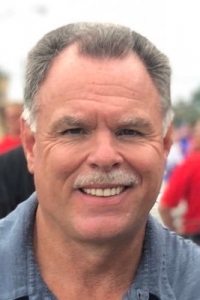
"Garry is running because he believes for us to have real change, we must unite all Chicagoans around the causes of restoring transparency and fairness to government, developing a real plan to make us safe again, revitalizing our schools and stopping the school closings," his campaign website said.[19]
McCarthy discussed the issues of crime, taxation, and school closings as interconnected, saying crime and taxes force residents to leave the city, which leads to school closings and an increase in gun violence. He said his 35 years in public service working for police departments equipped him to address these issues. McCarthy described himself as a public servant as opposed to a politician or a bureaucrat, saying he could bring performance-based government to Chicago.[6][1]
Susana Mendoza
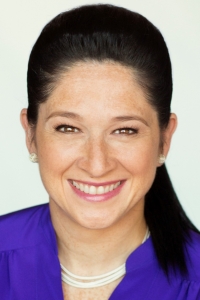
"The big issues that Chicagoans face – violent crime, high property taxes, improving schools — those are issues I have dealt with my whole life," Mendoza's campaign website read. "It’s time to have a mayor who is from the neighborhood, who understands neighborhoods and puts neighborhoods first."[20]
She emphasized her role as state comptroller, saying she was uniquely prepared to address the city's fiscal challenges. She also referred to being the mother of a child in Chicago Public Schools, saying she was personally invested in the education system.[21][9]
Toni Preckwinkle
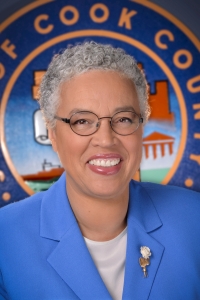
Preckwinkle said she was the most progressive candidate in the race and that she "beat the machine on my third try to be elected alderman." Her campaign website argued that her political and professional background "gives her a unique understanding of the issues and challenges that our region faces."[22]
She referred to her record on the Cook County Board of Commissioners, saying she worked to expand access to healthcare and on criminal justice reforms leading to fewer people in jail. She also said that, as alderman, she supported affordable housing and living wage ordinances, worked to strengthen schools and neighborhoods, and worked to increase public safety.[2][21]
Neal Sáles-Griffin
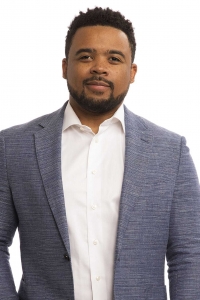
"Problems aren't going to be solved by the level of thinking that created them. So young folks and people with different perspectives and experiences in Chicago, we finally have to step up," Sáles-Griffin said of his decision to run for mayor.[23]
He said he is a lifelong Chicagoan and that many of his family and friends had moved away due to concerns around safety and education. Sáles-Griffin referred to his experience as a teacher and as both the son of a police officer and someone who had conflicts with police officers as equipping him to address these challenges. He said his top priority would have been providing residents with a receipt for how their tax dollars are spent.[23][24]
Paul Vallas
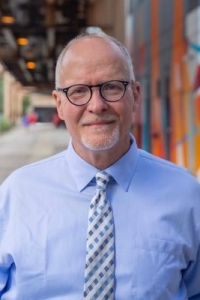
Vallas said he was a problem-solver and "the only candidate with the skills and the track record to manage this great city from day one."
He referred to his experience, including as the CEO of Chicago Public Schools and as superintendent of districts in Philadephia and New Orleans, saying he balanced multibillion-dollar budgets and managed large schools systems. Vallas emphasized that he entered the mayoral race before Emanuel withdrew, describing himself as outside pay-to-play culture and machine politics.[14][1]
Willie Wilson
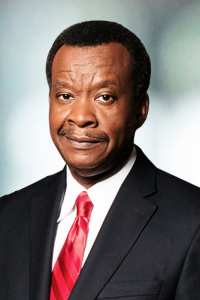 "It can no longer be Republican against Democrat, citizens against police, White versus Black, rich versus poor. We must achieve the original vision of our country – to be a place where all people can be free to pursue life, liberty and happiness – truly one nation under God," Wilson said on his campaign site.[25]
"It can no longer be Republican against Democrat, citizens against police, White versus Black, rich versus poor. We must achieve the original vision of our country – to be a place where all people can be free to pursue life, liberty and happiness – truly one nation under God," Wilson said on his campaign site.[25]
Wilson highlighted his personal background growing up in poverty in Louisiana raised by a sharecropper. He said he worked his way up from a 7th grade education to owning a successful international company and that he gave most of his income to the community. Wilson described himself as pro-business and emphasized his support for lowering taxes for citizens and corporations in Chicago.[1][2]
Footnotes
- ↑ 1.0 1.1 1.2 1.3 1.4 1.5 1.6 Facebook, "WGN TV: Chicago mayoral candidates forum," January 10, 2019
- ↑ 2.0 2.1 2.2 2.3 2.4 Facebook, "WGN TV: Mayoral Candidates meet with Tribune Editorial Board: Meeting 1 of 3 this week," January 15, 2019
- ↑ Chico for Mayor, "Videos," accessed February 11, 2019
- ↑ Bill Daley's 2019 campaign website, "Issues," accessed February 5, 2019
- ↑ YouTube, "Bill Daley's First TV Ad for The 2019 Chicago Mayoral Race: 'Let’s Get Real,'" December 6, 2018
- ↑ 6.0 6.1 6.2 Facebook, "Chicago Tribune on January 17, 2019," accessed February 5, 2019
- ↑ YouTube, "All of Us" | Amara Enyia For Mayor," January 28, 2019
- ↑ Amara Enyia's 2019 campaign website, "Home," accessed February 5, 2019
- ↑ 9.0 9.1 Facebook, "WGN TV: Mayoral Candidates meet with Tribune Editorial Board: Meeting 2 of 3 this week," January 16, 2019
- ↑ Bob Fioretti's 2019 campaign website, "Home," accessed February 11, 2019
- ↑ La Shawn Ford's 2019 campaign website, "Home," accessed February 14, 2019
- ↑ Jerry Joyce's 2019 campaign website, "Meet Jerry," accessed February 14, 2019
- ↑ Jerry Joyce's 2019 campaign website, "Public Safety," accessed December 21, 2018
- ↑ 14.0 14.1 Facebook, "Chicago Tribune: Editorial Board endorsement session: Chicago mayor (second session)," January 16, 2019
- ↑ 15.0 15.1 Lori Lightfoot's 2019 campaign website, "Home," accessed February 4, 2019
- ↑ WGN Radio, "Lori Lightfoot: I’m truly the only independent person of credibility that’s running for mayor," December 3, 2018
- ↑ Facebook, "38th Ward Democrats on December 11, 2018," accessed February 4, 2019
- ↑ YouTube, "Light," February 6, 2019
- ↑ Garry McCarthy's 2019 campaign website, "About," accessed February 15, 2019
- ↑ Susana Mendoza's 2019 campaign website, "Why I'm Running," accessed February 18, 2019
- ↑ 21.0 21.1 Facebook, "Fox 32 Chicago on February 7, 2019," accessed February 18, 2019
- ↑ Toni Preckwinkle's 2019 campaign website, "Public Service," accessed February 18, 2019
- ↑ 23.0 23.1 ABC Chicago, "Newsviews: Chicago mayoral candidate Neal Sales-Griffin & registering to vote in upcoming election," February 17, 2019
- ↑ Neal Sáles-Griffin's 2019 campaign website, "Story," accessed February 19, 2019
- ↑ Willie Wilson's 2019 campaign website, "Home," accessed February 15, 2019
| |||||||||





